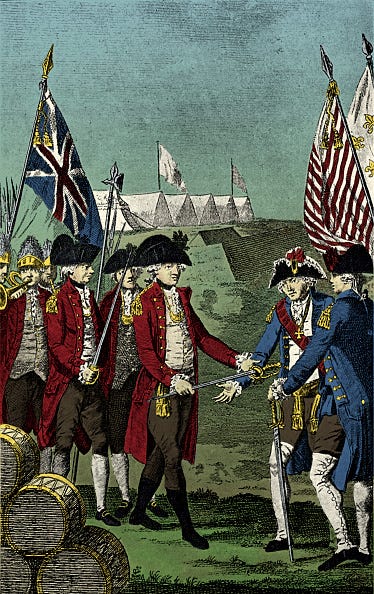The Writer's Almanac from Thursday, October 19, 2017
“One Ambition” by Paul Hostovsky from Is That What That Is. © Future Cycle Press, 2017.
ORIGINAL TEXT AND AUDIO - 2017
Today is the anniversary of the surrender that ended the American Revolutionary War, in Yorktown, Virginia, in 1781. George Washington had had a difficult spring. His troops were low on supplies and food, their clothing was in shreds, and there had been a steady stream of desertions from his ranks. By summer, Washington had only a few thousand troops camped at West Point, New York. The British expected Washington to attack New York City, which he had been planning to do for most of the spring. But when he learned that the British forces under the control of Lord Cornwallis were building a naval base on the Yorktown Peninsula in Virginia, he decided impulsively to march his army from New York to Virginia, in the hopes of trapping Cornwallis and capturing his army.
Washington's plan to move his army 400 miles in order to catch his enemy by surprise was a bold move. He had to march his troops toward New York City first, to scare the British into hunkering down for an attack. Then he quickly moved south. Washington's men and their French allies marched every day from 2:00 a.m. until it grew too hot to continue. It was a hot summer, and on one day, more than 400 men passed out from the heat. Few armies in history had ever moved so far so fast.
Lord Cornwallis learned of Washington's approach before he arrived, but Cornwallis chose not to flee, because he thought his troops would be evacuated by the British navy. He didn't realize that the British ships had already been routed by a French fleet from the south. So in the early weeks of October, he watched as Washington's troops surrounded the city and began a siege. After several days of bombarding the city with gun and cannon fire, Washington received word that Cornwallis would surrender.
Washington requested that the British march out of the city to give up their arms, and the surrender began at 2:00 a.m. on this day in 1781. The one soldier who didn't surrender was Cornwallis himself. Instead, he sent his sword with his second in command to be offered to the French general, signifying that the British had been defeated by the French, not the Americans.
In didn't matter though. England didn't have enough money to raise another army, and they appealed to America for peace. Two years later, the Treaty of Paris was signed, and the war was officially over.
It's the birthday of the spy novelist David Cornwell who writes under the name John le Carré, born in Poole, England (1931). In his novels such as The Spy Who Came in from the Cold (1963) and Tinker, Tailor, Soldier, Spy (1974), he's known for writing realistically about spies who aren't sexy or daring, like James Bond, but tired, lonely men, who barely trusted their own government more than they trusted their enemies.
His father was a con man who made money from fraudulent real estate deals and then racked up millions of dollars in gambling debts. Cornwell's mother abandoned the family when he was five years old. His father was in and out of prison for various fraud charges, so he was raised mostly by his father's various girlfriends. He never forgave the man. He said, "I think that my great villains have always had something of my father in them."
Today is the birthday of Tracy Chevalier, born in Washington, D.C. (1962). After college, she moved to London to stay for six months, but she fell in love with a British man and she has never left. She was a reference book editor for several years before she started writing historical novels. Her first novel, The Virgin Blue (1997), was a moderate success, and her second book, Girl With a Pearl Earring (1999), was a huge best-seller. Chevalier’s latest novel is New Boy (2017).






The Writer's Almanac always gets me ready for the day.....usually before the sun rises, but my kitchen light showers my Macbook Air with all the morning news that Garrison's Team is fit to print. Not all of it grabs my eyes, but with the potopouri of it all, I found enough today to note that Washington outsmarted British General Cornwallis and we won our independence from the Brits. Almost always I find a morning gem or two that features a writer, one or two of them that I've read and made me the better for it. Forthwith: "John le Carré, born in Poole, England (1931). In his novels such as The Spy Who Came in from the Cold (1963) and Tinker, Tailor, Soldier, Spy (1974), he's known for writing realistically about spies who aren't sexy or daring, like James Bond, but tired, lonely men, who barely trusted their own government more than they trusted their enemies." I've read them all. The stories he tells us are always engaging and most often shows us that so are his characters. We may need a bump ourselves and, for me, GK's summary is enough to energize mr, with my coffee of course, and my dear wife's dippable cookie. On we go!